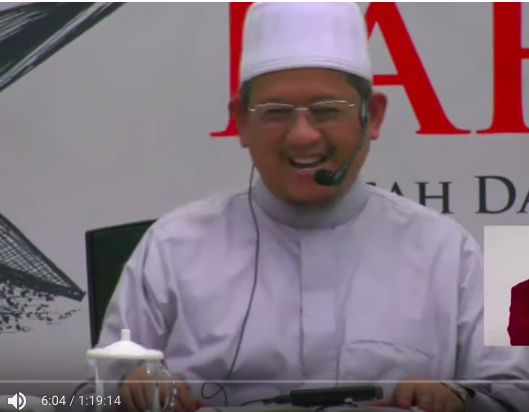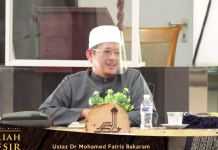This article is a summary of takeaways from Ustaz Dr Mohamed Fatris Bakaram’s Tafsir Lecture at Darul Makmur Mosque on 8th March 2020. Summaries of previous lectures on Surah Taha can be found here. This lecture is a continuation of last week’s lecture of Surah Taha verses 42 to 50.
Introduction
It has been seven sessions since we first started on the lessons from the life of Prophet Musa in Surah Taha. In the coming sessions, we will be looking at more incidents in the life of Prophet Musa AS. These include his showdown with the sorcerers of Egypt and the incident of Samiriy and the golden calf. These stories may not be unfamiliar, you may have heard of them in other Surahs during previous Tafsir lectures. Allah SWT has His reasons for revealing the Qur’an in a certain way. The seeming repetition in the stories are intentional and not redundant.
Some Surahs go into detail regarding certain incidents, while other Surahs completely do not mention them. We may not understand the wisdom behind the seeming repetitions in the book, but we know that Allah SWT has full power and knowledge about how the Qur’an was arranged and revealed. You may get bored with me, but you should never get bored with the verses of Allah SWT. If ever, you do find yourself getting bored or restless with the Qur’an, then have a look at your Iman. It may be that at that point of time, your heart may have been removed from light. Your heart may have been tainted or closed off as a result of sin and disobedience. Return to Allah, who is Most Generous and Most Powerful. Seek His forgiveness so that you may return to receiving His Blessings today and everyday until you enter Jannah.
What about the Former Generations?
قَالَ فَمَا بَالُ الْقُرُونِ الْأُولَىٰ
He (Firaun) said, “Then what is the state of the former generations?” [20:51]
Let us pick up from where we left off in the conversation between Firaun and Prophet Musa AS. The word “Quruun” used in this verse, is the plural of ‘Qarn’ which can be translated to ‘a century’. Firaun asked Prophet Musa AS about what has happened to the communities of people many centuries ago.
قَالَ عِلْمُهَا عِندَ رَبِّي فِي كِتَابٍ لَّا يَضِلُّ رَبِّي وَلَا يَنسَى
He (Musa) said, “The knowledge thereof is with my Lord in a book, my Lord errs not, nor does He forget; [20:52]
Prophet Musa replies saying that he does not know. This knowledge exists, but only with Allah, the one who never makes mistakes and Never forgets. The word “yadhillu” comes from the same word as “dholliin” in the Al-Fatihah. In al-Fatihah this word brings the meaning ‘those who are lost’. In this verse, prophet Musa AS is implying that “My God is not lost.”.
When we speak of a leader, we know that that are many things under his purview. We take, for example, the manager of Darul Makmur mosque. Under his management there are many departments; There are the admin staff, the asatizah (religious teachers), the zakat recipients and also the mosque visitors – both the “regulars” and the infrequent visitors. As efficient as he may be in his job, there are times when the manager may get lost because he does not have the information he needs. It is not likely for the mosque manager to know all the specific details of each visitor of the mosque (e.g. his family’s condition, where he lives, who his parents are etc.).
But Allah SWT, as a leader, is not lost. He rules over not only the people of the present and the past, but also every single creation that has existed and will ever exist in the world. He knows each of us and all that has ever happened in our lives, what secrets we keep and what worship we do. All of this is recorded in His book. And someday, when the time comes for the Day of Retribution, Allah SWT will know exactly what to give to each person – He will neither make a mistake, be “lost” nor forget.
Why did Firaun ask such a strange question? There are a few possibilities.
The first is that Firaun is ridiculing Prophet Musa AS by asking him, ‘You are now threatening me with punishment because of my disbelief. So tell me then, what has happened to the people of the past? My ancestors and the past generations were disbelievers too. They didn’t hear your message. Would they be punished as well? If you are truly a Prophet meant to save me, then why didn’t your God save the previous generations as well?’
Prophet Musa AS’ response is that the people of the past do not concern Firaun. They would have received their own share of Wahyu from Allah SWT. Their belief or disbelief has passed and is no longer something that can be changed. Allah will deal with them as He wishes, and they do not concern us in the present moment. So leave the past to Allah and focus on your own doings in the present.
The second possibility is that Firaun was mocking Prophet Musa AS by saying, ‘You say that my disbelief will lead to punishment and curse from Allah. Why then have we never heard of stories of punishment being sent down to my disbelieving ancestors? I am not the first pharaoh. My ancestors were disbelievers too.’ To this question, Prophet Musa AS’ response was to say that ‘Allah knows best what has happened in the past. He has the full right to decide what retribution to give to whomsoever he desires to give it to. In this world, you might not have heard of their recompense, however you also do not know what they may receive in the hereafter. So do not be concerned about that which does not concern you. Leave that to Allah who makes no mistakes. Come back to our conversation.’.
The Plants and their “Partners”
In the next verse, Prophet Musa diverts the topic so as to not dwell on stories of the past.
الَّذِي جَعَلَ لَكُمُ الْأَرْضَ مَهْدًا وَسَلَكَ لَكُمْ فِيهَا سُبُلًا وَأَنزَلَ مِنَ السَّمَاءِ مَاءً فَأَخْرَجْنَا بِهِ أَزْوَاجًا مِّن نَّبَاتٍ شَتَّىٰ
Who made the earth for you an expanse and made for you therein paths and sent down water from the cloud; then thereby We have brought forth many species of various vegetation. [20:53]
Prophet Musa AS brings Firaun’s attention to the wide expanse of the Earth, in order to remind him that the earth is not restricted to solely whatever lies under his own authority and command. While fleeing Egypt, Prophet Musa AS had seen the expanse of the earth during his travels. Firaun should not restrict himself by thinking small, when the world is bigger than he can even imagine.
Musa invites Firaun to explore the world seeing that the paths to the world have been opened up and laid out for all of Allah’s creations. Firaun needed to realise that his power was given by Allah to enable him to rule. And so he shouldn’t be complacent thinking he knows all things.
Prophet Musa AS was saying, ‘O Firaun, regardless of how powerful you are as a ruler, you have absolutely no power to decide where the rain falls. You cannot take Egypt out of drought or famine. You cannot determine what plants emerge from the dry soil.’
Now, let us have a closer look at this verse where Allah mentions the word “Azwajan”, the plural word for “zauj”. What does this word mean? In today’s context, in Arabic we learn of ‘Zauj’ meaning ‘spouse’, or more specifically, ‘husband’. The original meaning of Zauj though, is ‘partner’. This noun, unlike most nouns in the Arabic language is gender-neutral (i.e. if it is used to refer to a male’s partner, then Zauj will refer to a female and vice versa). When we use the word Azwaaj, we refer to more than one ‘partner’ – in this case, some scholars think that this word talks about plants having many types and varieties and not being restricted to just a pair of plants.
The word “Shattaa” in the same verse, however, can be translated to ‘wide diversity and various types’. As such, there is no need to translate Azwaaj as ‘various’ as well.
Another more contemporary translation of this verse translates the word Azwaaj to mean numerous pairs. Developments in science indicate to us that almost all living beings occur in pairs. This is not restricted to humans or animals – even plants have male and female parts. Azwaaj did not use to be translated into “pairs” by tafsir scholars of the past, because they had not been aware of the possibility of plants occurring in pairs.
Now that this information is made available to us, we can expand the Tafsir of this verse. This shows us how deep the knowledge of the Qur’an can get. There is always more to expand into the knowledge of interpretation of the verses of the Qur’an. This does not make previous Tafsirs obsolete. However, it gives us deeper insights into the same verses that have been looked into previously.
Soil: Our Origin and Our End
كُلُوا وَارْعَوْا أَنْعَامَكُمْ إِنَّ فِي ذَٰلِكَ لَآيَاتٍ لِّأُولِي النُّهَىٰ
(O people) Eat and pasture your cattle; most surely there are signs in this for those endowed with understanding. [20:54]
Allah SWT invites and gives permission to human beings to eat of whatever has grown from the soil as a product of the rain that falls, as well as the livestock which feed on the plants that grow from the soil as a result of the rain that falls.
مِنْهَا خَلَقْنَاكُمْ وَفِيهَا نُعِيدُكُمْ وَمِنْهَا نُخْرِجُكُمْ تَارَةً أُخْرَىٰ
From it We created you (O people) and into it We shall send you back and from it will We raise you another time. [20:55]
Allah is reminding human beings that we were created from soil and will eventually return to soil. Whether or not human beings are buried after their deaths to be returned to the soil, or they are cremated and their ashes scattered in the land and sea, they will eventually return to the earth. And from the soil, we will be raised again on the Day of Judgement.
There is a hadith telling us about something Rasulullah SAW did during a funeral, when burying the deceased. After lowering the body into the grave, he released a handful of soil into it saying, “Minhaa Khalaqnaakum”, meaning ‘from it We have created you’. He grabbed a second handful of soil, releasing it over the body saying, “wa fiihaa nu’eedukum”, meaning ‘and into it We send you back’. He followed it with a third and final handful of soil saying, “wa minha nukhrijukum taaratan ukhraa” meaning ‘and from it we will raise you another time’.
This practice has often been carried out during burials since then. This ritual serves as a reminder not for the deceased, but for those who are living – both the person giving the reminder and the people watching. A similar practice, done for the same reason is the Talqin, where the speaker addresses the deceased, informing him that the angels will come to question him in the grave. Whether or not the Talqin is recited will not affect how well the deceased is able to answer the questions being asked. However, the reminder is clear for those who are still living that they still have another day to live in searching for Allah SWT’s Pleasure.
Attending Funerals and the Janazah Prayer
In a hadith, Prophet Muhammad SAW said,
“Whoever follows a Janazah until the prayer is offered, he will have one Qirat of reward and whoever walks with the funeral until (the body) is buried will have two Qirats of reward, and a Qirat is like Uhud.” [An-Nasa’i]
We are encouraged to attend funerals, even if we just stand by and watch the body being lowered into the grave, we still receive a mountain of reward. When you attend a funeral and see the funeral prayer being conducted, do not deprive yourself of the potential reward by not participating in the Janazah Prayer. It is true that the Janazah Prayer is Fardhu Kifayah and as such, for as long as someone is carrying it out, it is not a sin for us if we choose not to perform it. However, it is such a waste and a loss for you to give the prayer a miss, seeing the potential reward available for you.
وَلَقَدْ أَرَيْنَاهُ آيَاتِنَا كُلَّهَا فَكَذَّبَ وَأَبَىٰ
And truly We showed him Our signs, all of them, but he rejected and refused. [20:56]
Firaun’s Concern
قَالَ أَجِئْتَنَا لِتُخْرِجَنَا مِنْ أَرْضِنَا بِسِحْرِكَ يَا مُوسَىٰ
Said he: Have you come to us Firaun’s that you should turn us out of our land by your magic, O Musa? [20:57]
Prophet Musa AS’ request was for Firaun to release Bani Israel (the Israelites) from slavery. It was not the request of Prophet Musa to ask Firaun to descend from his role of authority or to leave Egypt. So what made Firaun reply in the way that he did in verse 57?
Well, it was either that Firaun was so stumped by what to say next that he attempted to divert the topic again, or that he had great foresight. He knew that his power came from his ability to control and oppress people. He was aware that giving in to Prophet Musa AS would undermine his reputation. He knew that his authority would be lost the moment he releases Bani Israel.
Prophet Musa AS presented several arguments and tried different approaches to talk to Firaun. However, even after listening to the different points raised, Firaun only had one concern in mind. All he cared about was whether or not he could continue to rule. He was not at all interested in thinking about Allah, the truth or his future. He only worried about himself, his wealth and status.
When we want to help someone, we need to remember that focusing on the big picture may not help. As human beings, people are naturally more inclined to focus only on what is in their personal space (i.e. whatever they are presently dealing with in life. People are not concerned about Allah, the hereafter or distant things for as long as whatever is near is on their minds. We need to approach them by looking at what is important to them.
I give an example of a father trying to talk to his teenage son. In the child’s personal space is his school, his friends, sports, games and examinations. If you try to approach him and talk about the hereafter, his future etc. He will not be able to see the relevance. His future is 20 years away, he only sees what is directly in front of him. A person Is preoccupied with whatever is closest to him. If you want to go into the topic of the future, that’s ok. But start with what is near to the listener.
Another example I can think of is a pair newly-weds. A wife may come into marriage thinking that she wants to start living a better life as a Muslim. She might think “Now that I have fulfilled half of my Iman, I just need to focus on the other half. I want to be the best servant of Allah I can be, and I want my spouse to be just like me so that we can succeed together.” However, she needs to realise that her spouse may not be in the same space as her. Her spouse may still be in the space of his hobbies and his work life. Take things easy.
Go to his level and have a look at whatever he is dealing with. In such a situation, the best case would be to make clear your intentions and let your spouse know that you would love to walk this path with him. Invite him to join you in this journey of self-growth and development. Start small and work towards the end together as partners, do not run forward and leave your spouse behind in your haste to become a better person.
May Allah grant us His guidance and Wisdom to make use of the knowledge we have been blessed with to do our best in Service to Him and to the community.
Ameen.
Summary by: Arina Adom
Arina Adom is a lover of learning who takes on the world with an open mind. Resourceful and adaptable, always ready to take on new challenges. Comfortable working with diverse groups of people, yet able to work independently. Thrives under pressure. Currently seeking a meaningful career that enables me to impact lives directly and bring about positive changes in the lives of others in the community.
Arina graduated with a degree in Science ( Hons ), Life Science from NUS and is currently a Research Assistant at Evolutionary Biology Lab ( NUS ). She is currently taking a diploma in Quran and Sunnah Studies from Al Zuhri.
Watch Kuliah Tafsir again at
MUSLIM SG Youtube
Watch and follow Kuliah Tafsir weekly
every Sunday after solat Maghrib
organised Masjid Darul Makmur & Muslim.SG.
Your contributions are appreciated.Get more details by clicking the image below.











